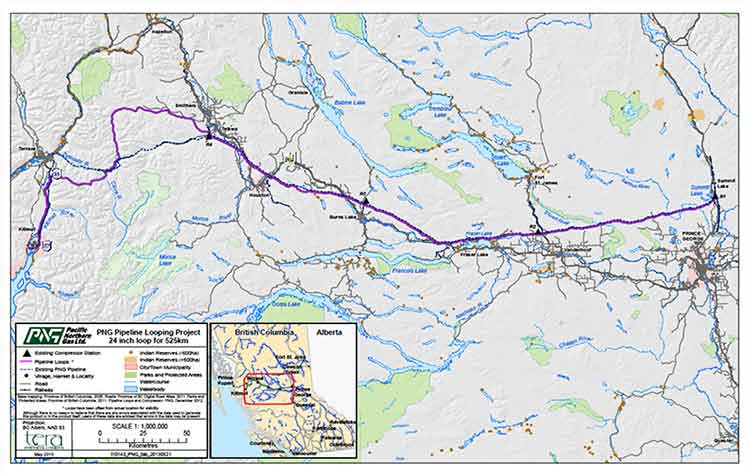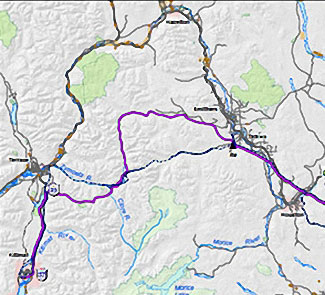Chevron, the lead corporation in the Kitimat LNG project announced on January 23 that the Moricetown Indian Band had agreed to join the First Nations Limited Partnership, in effect, approving the Pacific Trail Pipeline that would take natural gas to the project in Kitimat.
Here is the news release from all parties involved.
Vancouver, British Columbia, January 23, 2015 – The First Nations Limited Partnership (FNLP) today announced that Moricetown Indian Band (Moricetown) has joined the FNLP. The FNLP is a commercial partnership that, with the addition of Moricetown, now includes all of the 16 First Nations whose traditional territory is located along the proposed 480 kilometre Pacific Trail Pipeline (PTP) route from Summit Lake to Kitimat, B.C.
“The decision of the Moricetown First Nation Band Council to join the First Nations Limited Partnership is one that we warmly welcome,” said the Honourable Bob Rae, Chairman of FNLP.
“It means all 16 First Nations along the proposed Pacific Trail Pipeline route are partners in a unique approach that combines environmental stewardship, extensive job, procurement, and other economic benefits, and direct financial transfers on a regular basis to each First Nations community.”
The FNLP is without precedent in the Canadian energy industry and the Pacific Trail Pipeline is the only proposed natural gas pipeline for a liquefied natural gas (LNG) facility in B.C. with such a benefits agreement. The proposed PTP and Kitimat LNG Facility projects are owned by Chevron and Apache through a 50/50 joint venture and are operated by Chevron.
“This agreement is unparalleled in balancing strong economic growth measures with preserving our cultural heritage and the environment. There is, quite simply, no other deal that comes close to what we’ve been able to achieve in this partnership,” said Chief Dan George of Ts’il Kaz Koh (Burns Lake).
The commercial partnership ensures that FNLP Nations receive immediate and long-term benefits from the PTP project. These include up to $550 million in direct financial benefits over the life of the PTP project, including a recent enhanced benefit of $10 million a year operating life of the PTP project from the Province of British Columbia. The FNLP Nations also receive substantial economic development, skills training, employment and contracting benefits from PTP under the terms of the agreement.
“Chevron Canada wishes to commend all parties for creating a partnership between industry and First Nations based on mutual respect, trust and economic self-determination. We welcome Moricetown as the 16th member of the FNLP, and look forward to building the Pacific Trail Pipeline with First Nations in a manner that places the highest priority on protecting people and the environment,” said Jeff Lehrmann, President, Chevron Canada Limited.
Measures that reflect environmental protection, vitality of traditional cultural values, protection of aboriginal rights and title, economic self-determination and a sustainable future for First Nations are also part of the FNLP agreement. Members of the FNLP have already received significant benefits to date from the agreement, including $17 million in financial payments.
“We have already seen over 1,600 First Nations members receive skills training through the PTP Aboriginal Skills to Employment Partnership, better known as PTP ASEP. Over 900 of these trainees have found jobs,” said Chief Karen Ogen of the Wet’suwet’en First Nation.
First Nations employment currently accounts for 54 per cent of all early works construction workforce hours to date on the Pacific Trail Pipeline. To date, FNLP members have also been awarded over $245 million in PTP construction contracts, and over 65 per cent of construction contract expenditures have been made to member First Nation businesses.
The agreement also facilitates joint ventures between FNLP and companies engaged in the PTP Project. As such, the FNLP Nations not only have a clear financial interest in the pipeline construction but, just as importantly, also have a strong voice in ensuring the preservation of environmental and cultural integrity.
“The FNLP is an innovative model for how industry and First Nations can cooperate effectively with respect to major economic development projects,” said the Honourable Bob Rae.
About First Nations (PTP) Group Limited Partnership (FNLP)The First Nations (PTP) Group Limited Partnership (FNLP) is a limited partnership of 16 First Nations whose traditional territories are located along the transportation corridor between Summit Lake and Kitimat, British Columbia.
FNLP was formed to secure significant, reliable and long-term economic benefits for its limited partners from the proposed PTP Project.
FNLP member Nations are:
* Haisla Nation
* Kitselas First Nation
* Lax Kw’alaams Band
* Lheidleh T’eneh First Nation
* McLeod Lake Indian Band
* Metlakatla First Nation
* Moricetown Indian Band
* Nadleh Whut’en First Nation
* Nak’azdli Band
* Nee Tahi Buhn Indian Band
* Saik’uz First Nation
* Skin Tyee First Nation
* Stellat’en First Nation
* Ts’il Kaz Koh First Nation (Burns Lake Indian Band)
* West Moberly First Nations
* Wet’suwet’en First Nation
About PTP and the Pacific Trail Pipelines Limited PartnershipThe proposed 480-kilometre Pacific Trail Pipeline Project is jointly owned by Chevron Canada Limited (Chevron) and Apache Canada Ltd. (Apache) through the Pacific Trail Pipelines Limited Partnership (PTPLP). The PTP is intended to deliver natural gas from Summit Lake
B.C. to the proposed Kitimat LNG facility on B.C.’s north coast. The Pacific Trail Pipelines Limited Partnership (PTPLP) acquired the project in February 2011 from Pacific Northern Gas.
The fact that the Moricetown Band had held out for so long was seen as one of several factors that was holding up a Final Investment Decision by Chevron and its soon to be new partner, Australia’s Woodside Pretroleum, which is currently finalizing a deal to buy Apache’s stake in the project. Chevron vice chairman, George Kirkland was asked about it during an investor conference call in August, 2014 At the time, Kirkland hinted at the potential problems with the Pacific Trails Pipeline, where there is still a dispute with members of the Wet’suwet’en First Nation. “We’re going to focus on the pipeline and the end of the pipeline corridor. That’s important and we’re putting some money into that to finalize the pipeline routing, get all our clearances and then we’ve got work going on.”
The Unist’ot’en Camp group which opposes energy development in the traditional territory of that House has not yet commented on the announcement. However, earlier Friday at a protest in Winnipeg, Freda Huson, Spokesperson for the Unist’ot’en People and Hereditary Chief Toghestiy of the Likhts´amisyu Clan, issued this statement.
¨The Hereditary Chiefs of the Wet´suwet´en People will stop all attempts from Pipeline Companies, Colonial Governments, and their sell-out employees from bringing Tar Sands Bitumen or Fracked Gas onto our lands. We have ancestral integrity which guides us and will help us ensure that we make the right decisions to protect our lands for all of our unborn generations. We will hold ALL those accountable for attempting to enable destructive agendas to take hold on our sacred lands. We will use our traditional governing systems, the colonial courts, grassroots Indigenous Peoples, and our media savy to make everyone associated with Pipelines, Tar Sands, and Fracking activity from affecting our unceded lands. We are armed with our indomitable spirit and 2 Supreme Court of Canada decisions and will use them against any more aggressors on our unceded lands. Consider this a warning for attempting to trespass on our homelands. We have defended our lands for countless generations and we will stand up like our ancestors have to ensure that we never are viewed as weak in the eyes of our ancestors or children.



